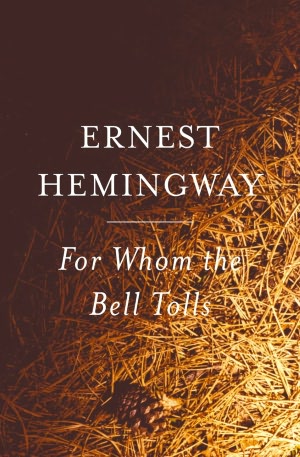I had a rough start with For Whom the Bell Tolls by Ernest Hemingway. As his is typical style, it was written in a matter of fact, moment by moment description, in this case mostly from the voice of Robert Jordan, an American fighting with the revolutionary guerillas in the Spanish Civil War. But, Hemingway accomplished his goal and while reading it I felt like I was there with him, moment by moment, which is probably also the reason why I never made it past 3-5 pages when reading it before bed and why it took multiple in-flight reading swathes of time and my break from school to finish.
About two thirds of the way through, Jordan spends time reading the letters found in the pockets of a dead opposing cavalryman, which spurs on one of the longest inner conversations that the reader hears in the story. The entire account is fascinating, and is Jordan thinking about who and why he has killed. Here are a few excerpts:
"You never kill anyone you want to kill in a war, he said to himself," (302)...
"How many of those you have killed have been real fascists? Very few. But they are all the enemy to whose force we are opposing force," (304).
"Listen, he told himself. You better cut this out. This is very bad for you and your work," (304).
I would argue, and actually don't think it's that controversial of a theory, that the reading of his dead enemy's letters were what brought on his mental struggle with the death that accompanies war. What I find interesting about this, though, is that it comes back to the core of my own beliefs: once you know someone's personal story, even the bits of daily minutia detailed in letters Jordan read, it is near impossible to view them in the same way.
I struggle with war because whenever I read about it. I am constantly thinking about the lives of the lost--on either side--and generally it is the daily minutia that destroys me. The first time I visited the Holocaust Museum in Washington, D.C., it was the displays of the personal effects those sent to concentration camps gave up: the piles of brushes and razors, the pile of shoes.
This is what creates empathy in literature and I why I plead with people to read...and write. To me, reading is the great metaphor for understanding humanity and a reminder for me to remember that everyone in front of me has a story--whether it's a student who is driving me crazy, the driver who is honking at me to walk faster through a crosswalk, a stranger I pass on a run.
The interesting part of this excerpt from the book, though, is that Jordan says that thinking in this vein is very bad for his work--which is true. To fight for his cause in this context, personalizing the enemy would lead to failure. He talks himself through the fact that he must do what he is doing to create a better world for the future: and yet, there are people fighting on the other side who believe the same thing, whether it is war on a national level or between two people. And sometimes, looking back, there is a clear, right side. Sometimes there isn't.
I wonder a lot about the fact that throughout history, it has come down to fighting to achieve freedom. I wonder a lot about what this says about us as people. I wonder about what would create a world (or nation or state or city or home) without violence. I don't think it's possible to live without conflict, but I wonder what it would take to teach us to handle it differently. Over the next week or so, I'm going to be writing about it as many of my recent reads have been about war, both fiction and non fiction, adult and young adult. I have no answers and it only gets more complicated, but reading and writing is the only way for me to work through it all.

No comments:
Post a Comment